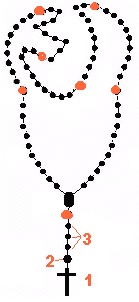|
The Franciscan Crown, or "Rosary of the Seven Joys of the Blessed
Virgin Mary" -- also known as the "Seraphic Rosary" -- is a 7-decade
Rosary that focuses on the 7 Joys of Mary. It's an ancient Franciscan
sacramental that has its origins in A.D. 1422, when a young man, whose
name is unknown to us, joined the Franciscan Order. He'd had the
practice of crowning a statue of Mary with garlands of fresh flowers,
but couldn't continue the practice during his novitiate. When he was
tempted to leave the Order, he had a vision of Our Lady, who told him,
"Do not be sad and cast down, my son, because you are no longer
permitted to place wreaths of flowers on my statue. I will teach you to
change this pious practice into one that will be far more pleasing to
me and far more meritorious to your soul. In place of the flowers that
soon wither and cannot always be found, you can weave for me a crown
from the flowers of your prayers that will always remain fresh."
She then asked that the novice say one Pater and 10 Aves in honor of
each of her Seven Joys -- the Annunciation; Visitation; Nativity;
Adoration of the Magi; Finding Jesus in the Temple; Resurrection; and
Assumption and Coronation of the Virgin.
The young friar began his prayers as instructed, and when he was deep
in the middle of it, the novice master noticed him, and watched as an
Angel wove a garland of fresh roses, inserting a golden lily after each
tenth rose. When the novice's prayers were finished, the Angel crowned
him with the garland.
The novice master asked if the novice knew anything about the vision
he'd just seen, and after it was explained to him, he told the rest of
his brothers what he'd seen. Thereafter, the practice of reciting what
became known as the "Franciscan Crown" spread.
Seven decades of 10 Aves equal 70 Aves, but two Aves were later added
to make the total of the Aves equal to seventy-two, the number of years
that Our Lady is said to have lived on earth.
When praying the Franciscan Crown, one can keep count on standard Dominican Rosary Beads, just going an extra two
decades; use no beads at all; or obtain a 7-decade Rosary made just for
praying the Franciscan Crown. The beads do not have to be
blessed (unless one is praying the Franciscan Crown publicly and is
intending to gain the indulgences given to those attached to the
Franciscan Order when making this devotion).
To pray the Franciscan Crown:

|
1. Kiss the
Cross and pray the Apostle's Creed
2. Pray an Our Father
3. Pray a Hail Mary on each bead
Then, on each
large red bead, announce Mary's joy you're focusing on.
Pray an Ave on each of the ten beads in between the large red ones.
If praying on a Dominican Rosary (the standard Rosary), go around to
more decades to make for 70 Aves.
Then add two Aves
at the
end to make for 72 Aves in total, the number of years Our Lady lived on
earth.
Optional: add a Pater, Ave, and Gloria at the very end for the
intentions of the Holy Father. |
Some announce the Joys by incorporating them into the Ave, like this:
Hail Mary, full
of grace, the Lord is with thee. Blessed art thou amongst women, and
blessed is the fruit of thy womb, Jesus, Whom thou didst joyfully
conceive. Holy Mary, Mother of God, pray for us sinners, now and at
the hour of our death.
There are many
variations of the Seraphic Rosary: some
add Glorias to the Paters in between the decades, etc.
Note that we remember Mary's Sorrows on the Feast of the Seven Sorrows and again in
September.
|
|

